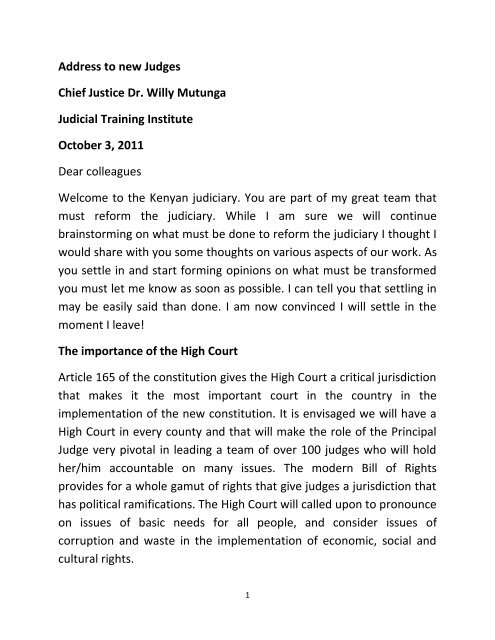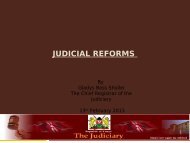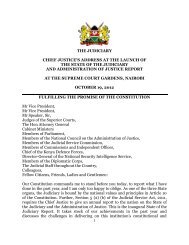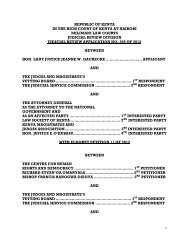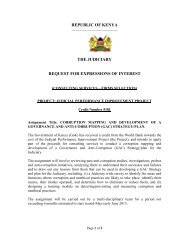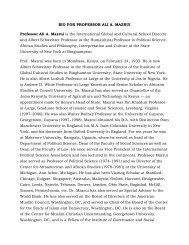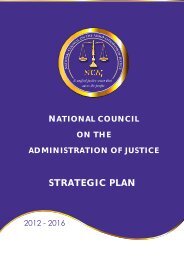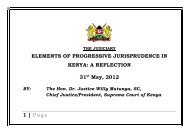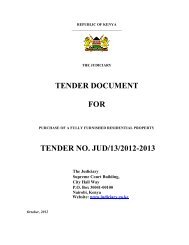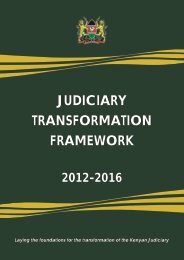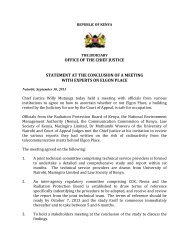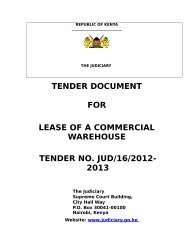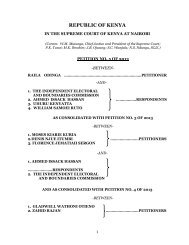SPEECH - INDUCTION HIGH NEW JUDGES.pdf - The Judiciary
SPEECH - INDUCTION HIGH NEW JUDGES.pdf - The Judiciary
SPEECH - INDUCTION HIGH NEW JUDGES.pdf - The Judiciary
Create successful ePaper yourself
Turn your PDF publications into a flip-book with our unique Google optimized e-Paper software.
Address to new Judges<br />
Chief Justice Dr. Willy Mutunga<br />
Judicial Training Institute<br />
October 3, 2011<br />
Dear colleagues<br />
Welcome to the Kenyan judiciary. You are part of my great team that<br />
must reform the judiciary. While I am sure we will continue<br />
brainstorming on what must be done to reform the judiciary I thought I<br />
would share with you some thoughts on various aspects of our work. As<br />
you settle in and start forming opinions on what must be transformed<br />
you must let me know as soon as possible. I can tell you that settling in<br />
may be easily said than done. I am now convinced I will settle in the<br />
moment I leave!<br />
<strong>The</strong> importance of the High Court<br />
Article 165 of the constitution gives the High Court a critical jurisdiction<br />
that makes it the most important court in the country in the<br />
implementation of the new constitution. It is envisaged we will have a<br />
High Court in every county and that will make the role of the Principal<br />
Judge very pivotal in leading a team of over 100 judges who will hold<br />
her/him accountable on many issues. <strong>The</strong> modern Bill of Rights<br />
provides for a whole gamut of rights that give judges a jurisdiction that<br />
has political ramifications. <strong>The</strong> High Court will called upon to pronounce<br />
on issues of basic needs for all people, and consider issues of<br />
corruption and waste in the implementation of economic, social and<br />
cultural rights.<br />
1
I see Chapter 6 and the legislation under it bringing in litigation that will<br />
call upon you to decide on issues that raise much political heat. Besides<br />
election petition there will be many cases under this Chapter urging you<br />
to disqualify individuals from holding any other State office. To my<br />
mind you be called upon to decide on issues of probity in public office<br />
whether elective or appointive. You will participate in the quest for<br />
alternative political leadership in the country as a consequence of<br />
implementing Chapter 6. We need to reflect on security issues that will<br />
be faced as implement the new constitution.<br />
Changing the face and image of the new judiciary<br />
You are the first judges in Kenya to be appointed after public interviews<br />
conducted by JSC. Kenyans were asked to participate in your<br />
recruitment. <strong>The</strong> provisions of Chapter 6 of the constitution and the<br />
values and principles laid out in Article 10 and other values provided for<br />
in various provisions of the constitution. You can claim your<br />
appointment complied with the provisions of Art 159 as your judicial<br />
authority and appointment was derived from the people themselves. In<br />
the eyes of the Kenyan public you represent the face of the new<br />
judiciary they wish to see. <strong>The</strong> expectations are astronomical. You will<br />
be subjected to pretty high standards of ethics and interest that will be<br />
monitored through consistent and continuous public scrutiny. <strong>The</strong> trust<br />
bestowed on you by the public must never be abused. You are the<br />
cornerstones of a transformative judiciary.<br />
Divisions are rampant in the <strong>Judiciary</strong><br />
2
It is common knowledge that divisions (ethnic, religious, gender, region,<br />
generation, race, nepotism, cultural and status) exist in the judiciary. I<br />
hope none of you has been recruited into any of these divisions. <strong>The</strong><br />
JSC and I are committed to creating a patriotic judiciary that sees our<br />
nation as bigger than any sectarianism. We will not hesitate to take<br />
disciplinary action to eradicate these divisions. In my view such<br />
divisions constitute such either gross misconduct or misbehavior under<br />
Article 168 of the constitution.<br />
<strong>The</strong> role of the JSC<br />
You have all encountered the new and expanded JSC representing<br />
respective interests in the judiciary, LSK, the Public Service Commission<br />
and the public at large. <strong>The</strong> CJ in JSC is no longer the unaccountable<br />
judicial monarch of the old constitution. <strong>The</strong> JSC is a realistic organ of<br />
recruitment, discipline, and oversight over the judiciary as mandated by<br />
the constitution and the relevant statute. Through its committees it will<br />
make sure that the administrative arm of the judiciary serves the<br />
judicial one while creating governance structures that modernize,<br />
democratize and decentralize the judiciary. <strong>The</strong> JSC will make sure that<br />
the new structure of the judiciary of the constitution is harmonized and<br />
synergized through proper management by decentralized leaderships.<br />
<strong>The</strong> JSC has the will to implement all reforms that the judiciary has<br />
recommended in the past. It will also protect the judiciary, agitate for<br />
better terms for the judiciary, and ensure the security of every judicial<br />
officer and paralegal. <strong>The</strong> JSC will play its pivotal role in ensuring the<br />
decisional and institutional independence of the judiciary is guaranteed<br />
and it will conduct a consistent and continuous dialogue with judicial<br />
officers and paralegals. It will oversee access to justice all over the<br />
country. You have in the JSC a very able, effective, very learned and<br />
3
extremely hard working representative in Judge Lenaola. You should<br />
always raise your concerns with him and above all come up with<br />
solutions to problems that will benefit the judiciary.<br />
Promoting robust jurisprudence<br />
I have discussed the role of the High Court in the implementation of the<br />
new constitution. We should assume that not all your decisions will be<br />
appealed against in the superior courts. We must get it right from the<br />
start. We have to conference, share views on legal issues before us, and<br />
create a robust jurisprudence that makes the law certain. We have<br />
systems in place that can help know what our sisters and brothers are<br />
deciding on some issues. <strong>The</strong>re is no reason for us a jurisprudence of<br />
leadership in various aspects of the lives of our people. I believe we<br />
have an opportunity under the new constitution to give leadership,<br />
through proper interpretation of the law and constitution, on critical<br />
matters that are burning in the nation. <strong>The</strong> constitution in my view<br />
shuns staunch positivism and encourages innovation and creativity. A<br />
cursory reading of Article 10 of the constitution will give you an idea of<br />
what I am talking about. In this regard I hope we will be able to revisit<br />
and understand the concept of judicial activism that I believe is<br />
misunderstood in the corridors of our judiciary.<br />
Judicial etiquette and new value system<br />
JTI should be able to give you the final draft of our judicial ethics and<br />
code of conduct. We have material that will determine our value<br />
system as judicial officers. We now have a legal and moral code that<br />
governs our behavior. As we talk about the public perception of the<br />
judiciary our value system as individuals and collectively as judicial<br />
officers is critical in changing those perceptions.<br />
4
I do not expect the judiciary to be a convent. We must tell Kenyans<br />
what we do and what we cannot do. I believe leaving the church before<br />
the service is over so that you do not create a perception that you are<br />
not independent is ridiculous! You must talk to the congregation. If any<br />
of them has the audacity to talk about their cases in court you simply<br />
tell them it is not done. I believe we will be believed by Kenyans if we<br />
interact with them and let them know that justice is not for sale. I<br />
expect you to give that message to your family, your friends, relatives,<br />
club members and people you meet in schools and places of religious<br />
worship.<br />
We must demystify the “status” of a judge; stop calling courts “ours”<br />
since they are now public courts. We need to exhibit modesty,<br />
humanity, caring, and patience as we hear cases. It will do no harm to<br />
have eye contacts will counsel and the parties. I have been in courts<br />
where our colleagues do not even look at the accused persons in the<br />
dock who may be bloodied up and need to be taken to hospitals!<br />
<strong>The</strong> role of JTI<br />
JTI must become our judicial think-tank, an institute of excellence, the<br />
nerve centre of robust and patriotic jurisprudence. I know many of you<br />
have great skills and expertise that can benefit JTI, the judiciary and the<br />
country. JTI will map these skills and expertise so that we have internal<br />
direction that can be reinforced by external interventions. I would like<br />
to see JTI host conferencing on critical issues attended by judges and<br />
magistrates where our collective intelligence can benefit the country.<br />
JTI will the institution where both mentorship and peer reviews are<br />
discussed. JTI must own its facilities and gradually become an institute<br />
of higher learning. I salute the vision, drive, commitment of Judge<br />
Kariuki and the invaluable assistance and insights that Judge Mureithi<br />
5
has brought to bear in the JTI. I know some of you have been great<br />
trainers and will continue to assist. JTI will train magistrates and<br />
paralegals. I know that soon JTI will be asked to help strengthen the<br />
capacity of the embryonic judiciary in South Sudan and soon other<br />
countries in the East African Community will follow suit.<br />
I need say no more. JTI is and will have to be one of the engines for<br />
undertaking fundamental reforms in the judiciary. Its approach must be<br />
multi-disciplinary and I hope we will be able to recruit not only<br />
specialists on stress management but counselors as well!<br />
One final comment on research that is important. I know that research<br />
has been punished rather rewarded in the past. This will never be the<br />
policy of the new judiciary and such work will find itself in the seminars<br />
of JTI. I hope the works of Judges Meoli, Nzioka and Weldon Korir, for<br />
example, can be the subject of brainstorming in JTI.<br />
Vetting of Judges and Magistrates<br />
I urge that we approach the vetting of our colleagues as an institution.<br />
We must make sure that the process is just, impartial and transparent. I<br />
know there are people who see the process as yet another radical<br />
judicial surgery. We must ensure the exercise is concluded as quickly as<br />
possible so that the despondency and anxieties among our colleagues<br />
comes to end and we can get down to the business of administering<br />
justice to our compatriots. We have urged that the Board be well<br />
resourced. We have recommended certain amendments to fast track<br />
the entire process. We must jealously guard the integrity of the<br />
institution of the judiciary.<br />
<strong>The</strong> next elections pose the real test for the judiciary<br />
6
I am convinced that a critical benchmark for judicial reforms we are<br />
undertaking shall be Kenyans coming to the courts convinced they will<br />
have justice over their claims over the concluded elections. We must<br />
make it known to all Kenyans and the world that we demand free, fair<br />
and peaceful elections. As a critical arm of the state we owe that<br />
position to our fellow citizens. If our demand is to be taken seriously we<br />
must start building confidence among Kenyans that we can be relied<br />
upon to give justice to both the poor and the rich. We must be sure<br />
going forward that Kenyans will not only fund the judiciary, but also<br />
solidly defend it. This can only happen if the judiciary becomes a<br />
judiciary for all Kenyans.<br />
Dr. Willy Mutunga, SC<br />
Chief Justice/President, Supreme Court of Kenya<br />
7


